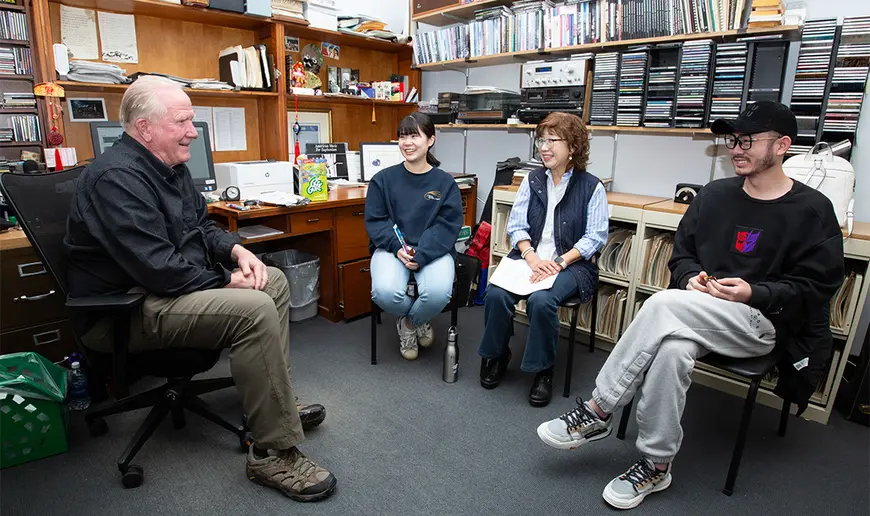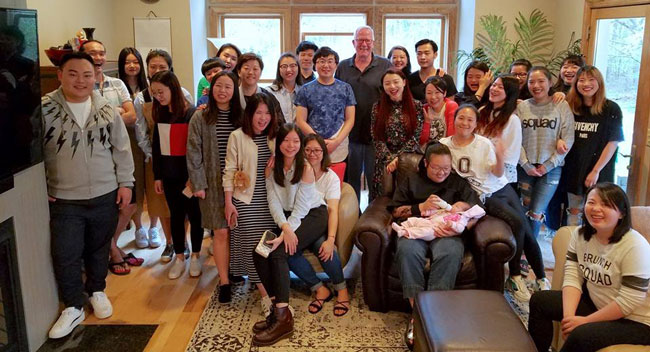

Engaging in casual conversation in a Mason Hall faculty office are (from left): Professor and Assistant Director of the School of Music Barry Kilpatrick, Hinaki Kiyohara, Assistant Professor of Music Therapy Heeyoun Cho and Dong Wang.
Accepted Students ONLY!
Join us Saturday, March 28 (10 AM–2 PM) for Go Big BLUE DAY — sessions, tours, and giveaways.
Sign Up Today!


Engaging in casual conversation in a Mason Hall faculty office are (from left): Professor and Assistant Director of the School of Music Barry Kilpatrick, Hinaki Kiyohara, Assistant Professor of Music Therapy Heeyoun Cho and Dong Wang.
Two students – one from Western New York and the other from far away Syria – meet each other at an “international chat” in a School of Music faculty office and start an impromptu conversation.
It’s doubtful, though, anyone else can follow what they’re saying because the language of choice of the pair – Levi Dowd, a senior Music Education major, with an Instrumental Concentration, from Wolcott, NY, and Tammam Odeh, a graduate student in Harp Performance from Damascus, Syria – is Arabic.
It was a vision last fall by School of Music Assistant Director and Professor Barry Kilpatrick to connect them at one of the informal gatherings he hosts several times each semester.
“I told one of my euphonium students about these international chats; he had been all over the world with the Marines for five years, and it turns out he speaks Arabic,” Mr. Kilpatrick explained, so he ended up inviting him, knowing that Mr. Odeh frequently attends the chats and speaks the same language.
“Levi came to the meeting and the two started to speak Arabic to each other,” Kilpatrick recalled. “It was very heartwarming, very gratifying.”
Kilpatrick, whose many hats in the School of Music include admissions director, has an open invitation for international music students to drop by his office for the informal gatherings, “and we just chat. It’s not necessarily every week – I probably did them four or five times last semester.”
“Levi came to the meeting and the two started to speak Arabic to each other. It was very heartwarming, very gratifying.” – Professor Barry Kilpatrick
Functioning as a study group session for international students facing challenges that are unique to international students was the impetus behind the chats.
“As an international student, everything can be a new experience. Many times, they come to the United States from a completely different culture – language, food, fashion, perspective, attitude, politics and even the education system,” explained Assistant Professor Jiyong Kim Mai. “Our international students come from all over the world.”
Sometimes it can be a pretty lonely journey for international students who are several thousand miles away from family, Ms. Mai added, so international chats serve as a valuable forum for them to gather.

Discussion topics are determined by the students. “Sometimes I assist them with the courses they are taking, and we have study groups for them,” Kilpatrick explained. Other times it can be little more than casual conversation. Kilpatrick invariably has become as an unofficial “Fredonia father figure” to the students, answering any questions they may have. Yet another hat he wears in Mason Hall.
The chats began in 2014 with four Chinese music students enrolled in the same graduate class, MUS 545: Romantic Period in Music, taught by SUNY Distinguished Professor James Davis. Making sure they understood their assignments was a frequent topic. A music theory course frequently taught by Associate Professor Gordon Root, MUS 624: Analytic Techniques, also for graduate students, has been the frequent focus of the chats over the years.
“These are simply informal chats. People arrive when they can, some stay for part or all of the thing,” explained Kilpatrick, who’s known by many international students as Prof. BK. The sessions are usually held on Friday afternoons.
For Hinaki Kiyohara, a graduate student in Music Performance from Higashiura-cho, Japan, the sessions provide opportunities to meet other students who have different majors and to also obtain information on specific subjects, such as visas, that are relevant to international students.
It’s not surprising that language poses a common challenge for the students in their study and life. “This meeting not only provides us with a comfortable environment to practice English speaking and allows us international students to better connect with each other, in addition, it also gave us a convenient environment to express the help we need,” said Dong Wang, a senior majoring in Music Therapy with a piano concentration, from Xinjiang, China. “BK even invites us to their home every year during Christmas.”
School of Music Dean David Stringham has experienced firsthand the ways in which Kilpatrick cares deeply, listens empathically and engages warmly to build community. “These international chats exemplify our faculty and staff's deep commitment to supporting all of our students throughout their educational journeys,” Dr. Stringham said.
“As a faculty member, and once an international student myself, I want them to feel safe to express their struggles. Sometimes, they might not need an answer or help, but just someone to listen,” Mai added.
At its pre-pandemic peak, the School of Music had nearly 40 international students enrolled at once. Countries represented in 2023-2024 in the School of Music include China, Korea, Japan, Syria and France.
“Nowadays it’s just a totally free conversation; I can’t say what the topics will be,” Kilpatrick noted. “One of the things that helps, and is really great, is when some international faculty come.” Mai, who’s from Korea, is a sterling example, Kilpatrick said, as she invariably energizes the whole session and knows what questions to ask the students.
“Professor Kilpatrick holds everyone together during these chats; he has been called the 'American Dad' by many international music students over the years. We are very grateful for Professor Kilpatrick,” Mai said.
Hosting chat sessions isn’t the only way Kilpatrick assists international students. Kilpatrick also convened an international music seminar for several years, which he said “forced” the students to speak in class, to make brief presentations and to learn music vocabulary. “They had all studied English for years, but not music terminology,” Kilpatrick said. “That became one of the main things I did with them.”
He and his wife, Cathe, who’s also become an unofficial “Fredonia parent” to international students in Mason Hall, have hosted the students at end-of-semester dinners at their home.
Kilpatrick visited China and South Korea several times, beginning in 2015, to attend seminars conducted by the American Association of State Colleges and Universities and Council on International Educational Exchange, and to participate in recruitment events.
International music student enrollment grew from 10, in 2014 – the year before Kilpatrick’s inaugural visits to both countries – to more than 40 in 2018. In one of those years, 2017, he and Professor and Coordinator of Piano Area Fr. Sean Duggan logged over 10,000 travel miles on their way to visiting 18 schools in 12 cities over 19 days. They heard a number of piano auditions by students ranging from high school to undergraduate students preparing to enroll in graduate programs.
Kilpatrick describes the international chats as a twist that’s been both great and surprising during the last 10 years as he reflects on a storied teaching career approaching an astounding 45 years at SUNY Fredonia, and contemplates retirement at the end of the spring semester.